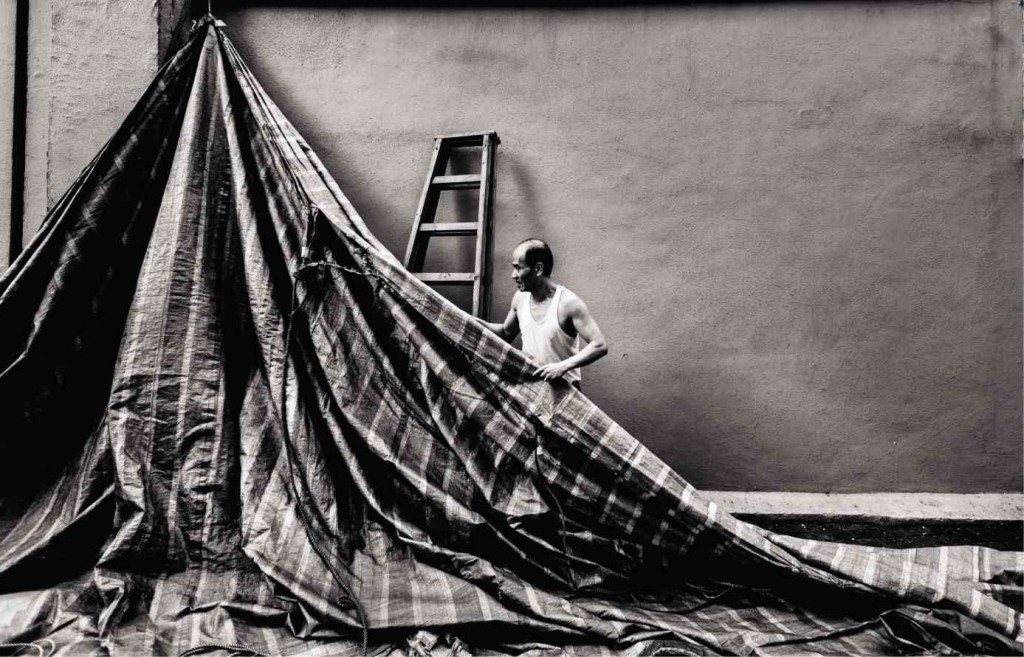
PHOTOGRAPHY BY BACANI A man prepares to open his stall for the night market on Temple Street in Mongkok District in Hong Kong. Her stunning B&W photos have brought acclaim to the Filipino domestic worker. XYZA CRUZ BACANI
HONG KONG — From her poverty-stricken roots in a Philippine backwater, via domestic service in Hong Kong to acclaim in New York, Xyza Cruz Bacani’s inspirational journey started with a camera bought with borrowed money.
The 28-year-old came to Hong Kong nine years ago to join 300,000 other women working as maids in the city, hoping to earn enough money to help fund her brother’s education.
But photography has transformed her life, her images of everything from trips to the supermarket to scenes of abuse at a refuge for domestic workers earning laudatory spreads in international media and at exhibitions.
With that in mind, just a week ago, she quit domestic service to pursue her passion for photography. But when she first came to Hong Kong, survival was her first priority.
“The urge to survive is much bigger than the urge to do art,” she told AFP in Macau where her photographs are on show as part of the city’s Literary Festival.
A self-professed dreamer, she said she also saw the move to Hong Kong as an opportunity to leave her home village, nine hours’ drive from the Philippine capital Manila.
“It was a big contrast when I arrived at the airport, I was very excited because everything is moving fast, and the lights are wonderful, it looks so alive compared to my village,” she said.
Her passion for photography really took off four years ago, when her employer — whom she describes as a “great lady” — lent her the money to buy her first camera, a Nikon D90.
“When I had (the camera), I shot landscapes to flowers to (portraits of) my mom, and then I did street photography.”
At first she only shared her pictures with friends on Facebook — mostly shot in grainy black and white, capturing street moments in classic reportage style.
A Filipino photographer based in San Francisco saw them on Facebook and was intrigued by their originality and quality. From there she came to the attention of the New York Times Lens blog and then of acclaimed photographer Sebastiao Salgado, who praised her work at an exhibition in Hong Kong late last year.
Reflecting on her journey thus far, she marvels: “Right now it’s changed my life 180 degrees, here I am having a show in Macau, going to places.”
A voice for the unheard
With increasing concerns over the treatment of domestic helpers in Hong Kong and the region, Bacani is now turning to documentary photography to try to draw attention to abuses.
“That’s what I want my photography to do, to be able to help people … to me photography is a very powerful tool to change someone’s perspective towards an issue,” she said.
In the summer of 2014, Bacani documented migrant workers who had taken shelter at a refuge after suffering abuse at the hands of their employers, an experience she described as “life-changing.”
“I was angry at first, it was a roller-coaster of emotion when I saw this kind of situation.
“I think I was there to be the voice of those domestic workers who remain unheard, whose voices have been muted.”
Just last month a judge sentenced a Hong Kong woman to six years in jail for beating and starving her Indonesian maid in a case that made global headlines.
“She said my domestic worker duties… are restricting me from growing up as a person, it’s a chain that holds me,” Bacani said, after stopping her domestic work last week.
Bacani’s story has inspired many other helpers in the city, and she is urging them to pursue their dreams too.
“They keep on telling me… now that they’ve seen me, I made them realize that it’s possible to do the things that you really want to do outside your job.
“I want people to see that your job, your work, it doesn’t define who you are,” she added.
“The dreams that I had when I was young, I’m having them now.”
RELATED STORIES
Filipina domestic worker-photog in HK wins scholarship to NYU
Xyza Bacani’s HK journey passed through SF
‘I don’t feel like an OFW, just a girl with a camera’ shooting HK’s street life